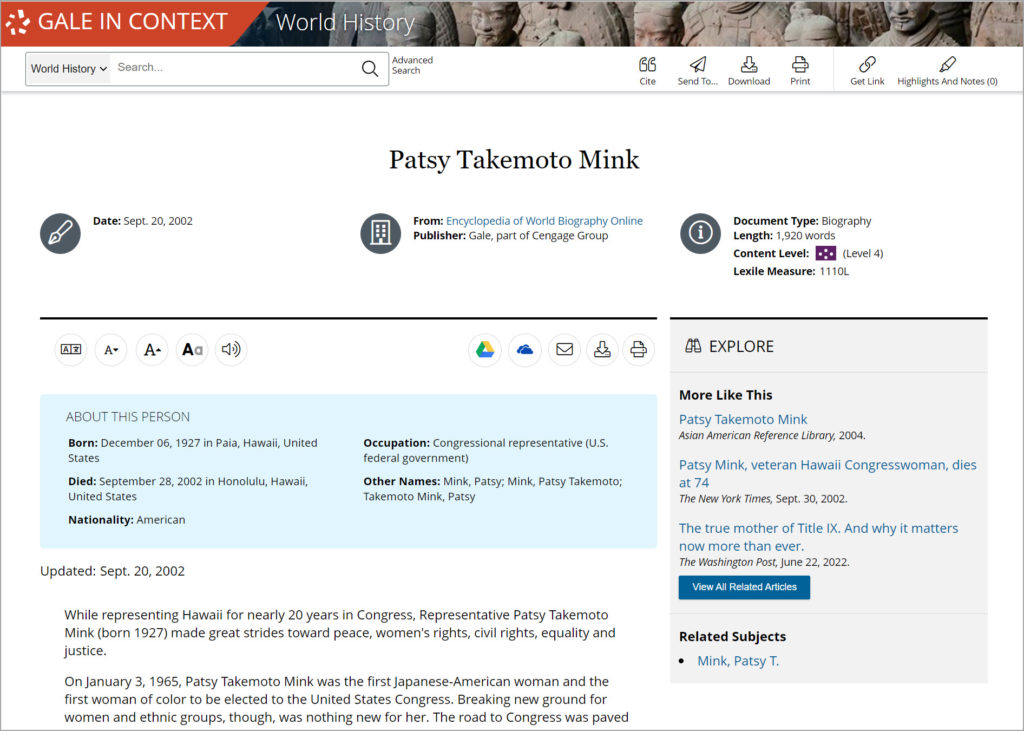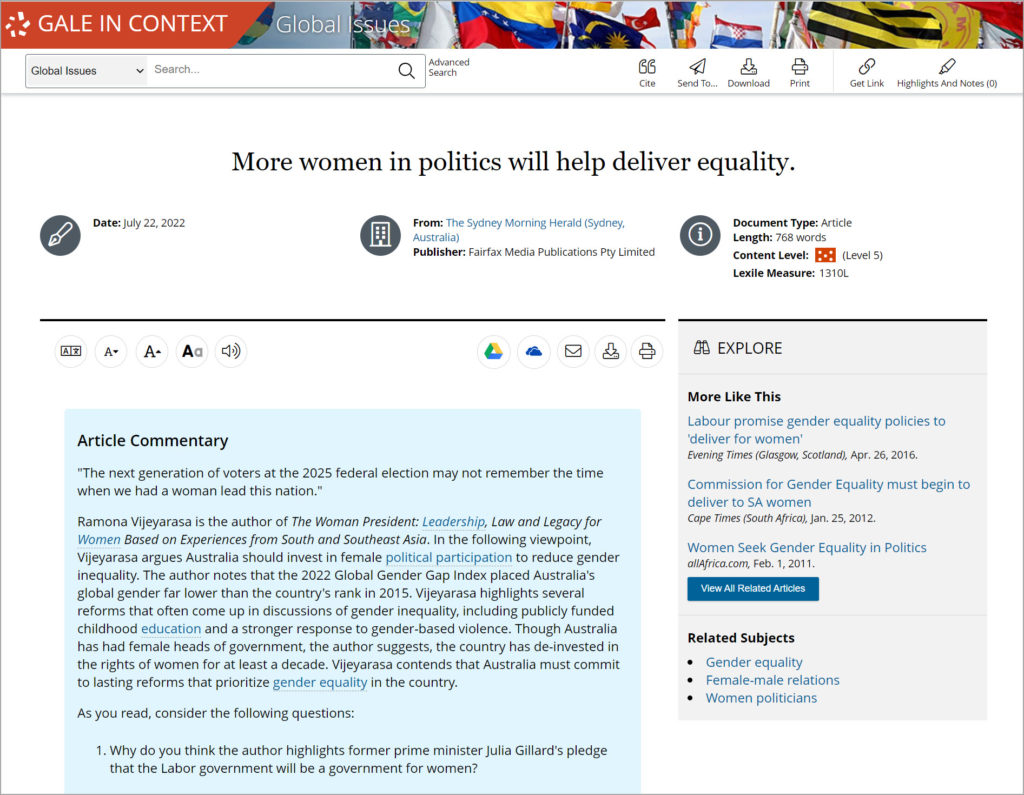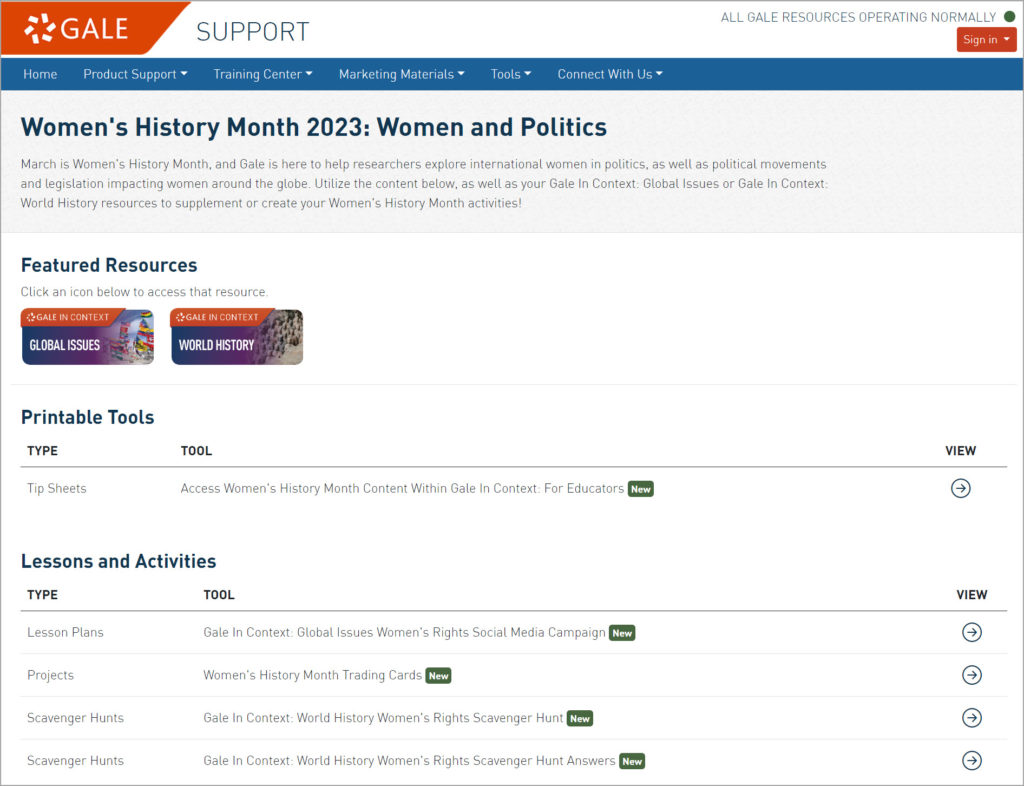| By Gale Staff |
Educators and librarians have an opportunity this March to not only observe Women’s History Month but to showcase female achievements in the fields in which women are underrepresented. By introducing these stories into different academic spaces, you can help inspire young learners who identify as female. Seeing people like themselves in positions of influence and innovation can be especially powerful. In fact, it’s important that everyone, regardless of gender, learns about the fight for women’s rights. It’s a piece of our country’s history, and your students will undoubtedly make dynamic connections between the struggles of the past and modern-day conflicts.
This March, take a moment to discover women in politics. Given that women only got the right to vote in 1920, it’s truly amazing how far American women have come in the world of politics. The newly sworn-in 118th Congress is made up of 28% women—the most in U.S. history. Alexandria Ocasio-Cortez and Nancy Pelosi are household names. Kamala Harris, a woman of color, is the first female vice president. Besides breaking records and establishing precedents, women in 2023 are challenging the political status quo in new and exciting ways.
With Gale In Context: Global Issues and Gale In Context: World History, teachers, students, and librarians can learn about these amazing female pioneers, discovering their stories of perseverance and success. During Women’s History Month, take advantage of Gale’s rich anthologies and built-in classroom activities to creatively integrate women in politics into your lesson plans.
Feature Female Political Figures in Your History Class
World History houses biographical content for U.S. history teachers who wish to discuss the role of female politicians in their classes. Inspire students with stories like that of Patsy Takemoto Mink, who was the first woman of color elected to Congress. Mink was a Japanese-American who served as a representative of Hawaii in the House of Representatives. She was elected in 1964 (the Senate didn’t follow suit until 1992 when Carol Moseley Braun became the first woman of color in the U.S. Senate).

Patsy T. Mink was a top student, hoping to become a doctor someday. However, because she was female, no medical schools would accept her. Nevertheless, she was committed to pursuing a career through which she could be of service to other people, so she instead entered law school in 1948 (though women made up just a tiny fraction of U.S. lawyers at the time). Mink continued to push through barriers when she entered Congress. She fought for African Americans’ voting rights, protested the Vietnam War, and in 1971, she even ran for President.
Each entry in Gale In Context: World History features additional recommended resources for further study, including related articles and images. The information is extensive but well-organized, so you and your students can easily navigate the collection.
Learn About Gender Equality on a Global Scale
Global Issues houses content related to government, health, science, and culture, lending this resource to a range of classroom settings. Encourage your students to research how different countries view gender equality and how U.S. women have shared or dissimilar experiences. Articles in Gale often include guided questions to spark your students’ curiosity and facilitate rich class discussions.

Consider beginning your research with the Women in Politics summary in Gale In Context: Global Issues. Ask students to name political figures who identify as female. How many can your class come up with? Encourage students to discuss what barriers women face while pursuing a political position. Consider the early coverage of Vice President Kamala Harris. Or read oppositional viewpoints to her work in public office. Does her gender influence the way she’s critiqued in the media?
Enliven Your Lesson Plans
While outlining your March lesson plans, don’t forget to tap into Gale’s Support Site. We have a dedicated portal for Women’s History Month with recommendations to either start or supplement your class activities. Assign students a research project on a female world leader, past or present (Kamala Harris, Margaret Thatcher, Indira Gandhi, Angela Merkel, or Micheline Calmy-Rey, to name a few). Your class can create one-page biographies of their chosen politician, highlighting her accomplishments. Hang their work around the classroom or library so others can learn about these important figures throughout the month of March.

Teachers and librarians work hard to create meaningful, thought-provoking activities for young learners, and Gale databases provide extra support. If your institution does not already subscribe to Gale In Context: Global Issues and Gale In Context: World History, reach out to your local rep to learn more.


